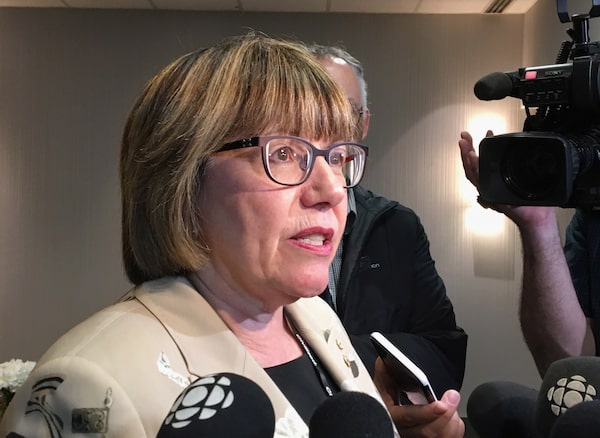As Ottawa prepares to take its final steps toward legalizing the recreational use of marijuana, the head of a task force that made recommendations to the federal government for the bill issued a warning to industry members not to “play fast and loose” with the new rules.
Speaking to industry members gathered at the first World Cannabis Congress in Saint John, former Liberal cabinet minister Anne McLellan said Canadians are becoming increasingly sensitive about the legalization of cannabis as its advent draws nearer. She urged companies that are licensed to produce cannabis – many of which have bristled at the strict limitations the government is pursuing on branding and packaging their products, for example – to respect legislators’ cautious approach and boundaries.

Former Liberal cabinet minister Anne McLellan speaks to reporters at the World Cannabis Congress in Saint John on Monday, June 11, 2018.Kevin Bissett/The Canadian Press
“Everybody had better be on their best behaviour for the first few years after legalization because there is a societal fragility to this,” Ms. McLellan said. “We’re not going to get it all right out of the box. The ability to be nimble and flexible is important here.
“We may not love all the rules out of the box,” she said, adding: “Don’t underestimate, if this goes bad, if people play fast and loose with the rules, there could be enormous societal push-back. Politicians respond to political pressure.”
Related: Will going mainstream dull the culture of cannabis?
Marijuana legalization: How Canada is planning on regulating recreational cannabis
She went on to warn that it could take up to a decade for the government to refine the legalized regime for cannabis.
Several licensed producers in the audience received Ms. McLellan’s message with frustration.
“We have no intention of skirting the regulations,” said Ray Gracewood, chief commercial officer for Organigram Holdings Inc., which is based in Moncton.
“We are all aligned on wanting to keep [cannabis] out of the hearts and minds of children and eliminating the illicit market. Those are our two objectives,” he said. “But we need to do everything we can to be competitive with other licensed producers and the illicit market.”
Jay Wilgar, chief executive of Up Cannabis, warned that “the patience of licensed producers will wear over time” and said producers need more freedom to communicate the benefits of legal cannabis to deter consumers, including youth, from the illicit market.
In her presentation, Ms. McLellan said Canadians between the ages of 11 and 15 use more cannabis than in any other part of the world. Keeping marijuana out of the hands of youth is a key objective of the effort to legalize and regulate recreational cannabis.
Health Canada wants packaging that is child-resistant, opaque, without graphics or images, and in one uniform colour. Embossing or shiny lettering will be prohibited, while branding and logos will be restricted.
All products will also need health warnings that say marijuana can be addictive, harmful to a fetus or nursing infant, and should not be used before operating machinery. A logo in the shape of a red stop sign with a cannabis leaf and the letters THC will be required, as well as information on levels of active ingredients.
After spending several contentious months making its way through the Senate, Bill C-45 passed the upper house last week by a vote of 56-30 and, with nearly four dozen amendments, it returns to the House to be voted on and adopted with or without the Senate amendments.
It was just two years ago this month that Ms. McLellan was appointed as chair of a federal task force mandated to advise the Trudeau government on its landmark move to lift Canada’s 95-year prohibition on recreational cannabis.
Ms. McLellan told Monday’s audience of investors, policy makers and industry participants from around the world that in spite of the Senate delays, Canada’s legalization effort “has moved remarkably quickly.”
“This is a major public policy transformation, a societal transformation,” she said. “This is a remarkable feat that speaks to the focus of the Government of Canada.”
Ms. McLellan also warned that challenges related to Indigenous consultations are likely to escalate.
“This is going to get really contentious before we work through what the role of Indigenous communities will be in this new, emerging legal cannabis market,” she said. “This is a potential economic engine for some communities across the country. Their role as retailers, on-reserve or off-reserve, is an important question.”
 Jessica Leeder
Jessica Leeder